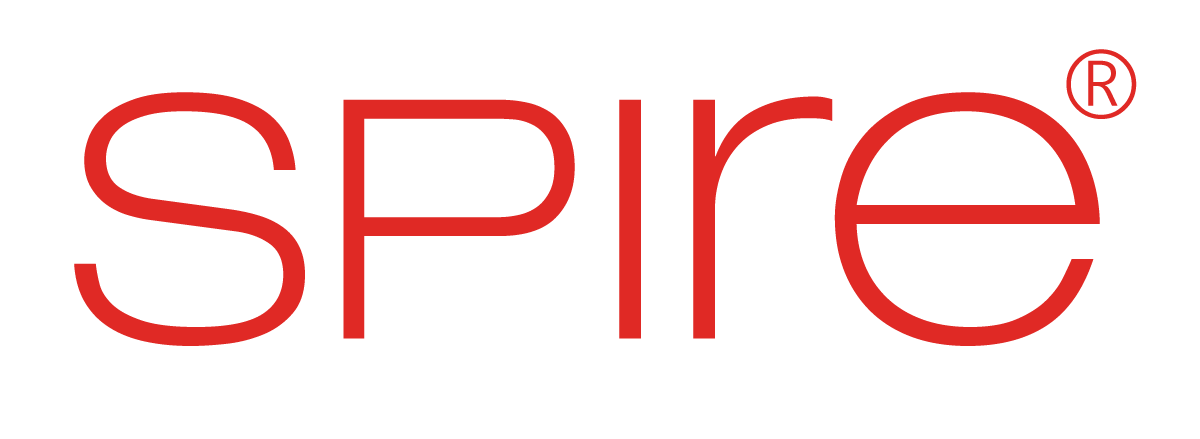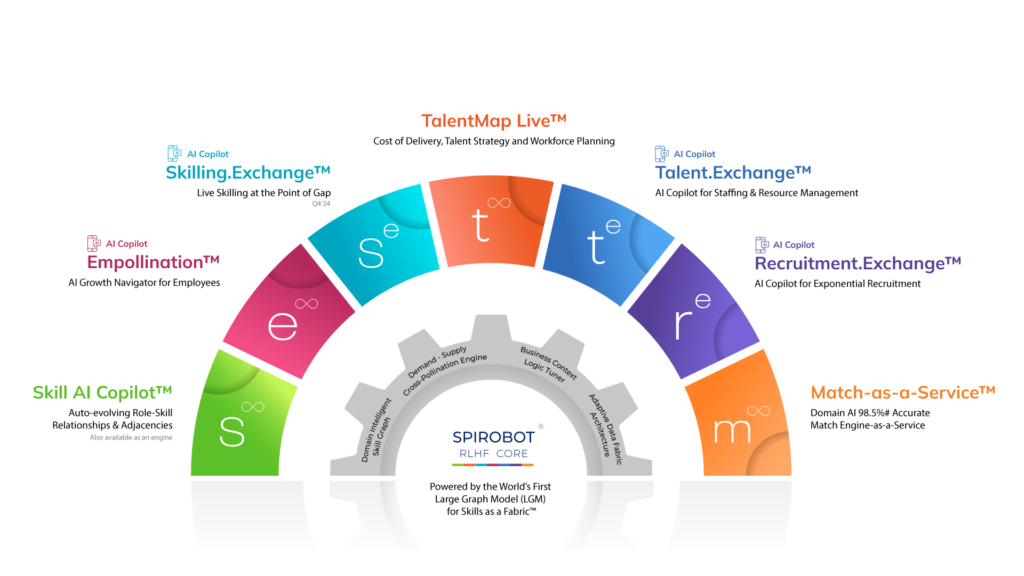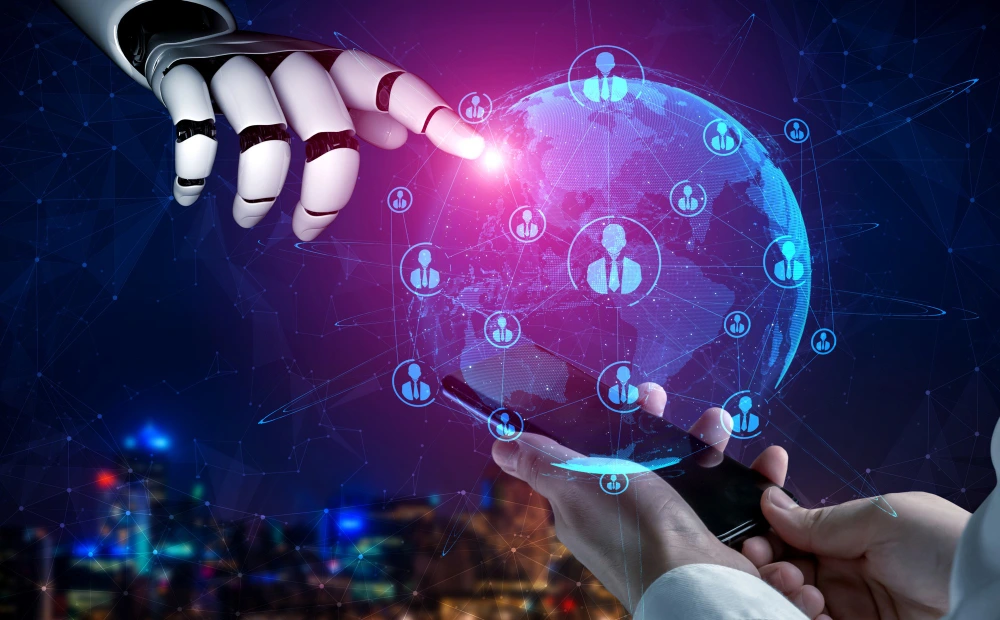Workforce management is undergoing a radical transformation, driven by the rise of AI-powered workforce intelligence. No longer confined to administrative tasks, AI agents are now actively reshaping how businesses manage talent, optimize performance, and drive strategic decisions.
Moving beyond traditional Human Resources (HR) technologies, these AI-driven agents function as intelligent workforce companions anticipating needs, personalizing career development, and ensuring organizations stay ahead in a competitive talent landscape. This shift is not just about technological enhancement but fundamentally rethinking how human capital is managed and nurtured.
The Evolution: From Traditional HR Systems to AI-Driven Workforce Intelligence
HR management has historically been built on structured, rules-based systems that primarily focus on administrative efficiency. These systems were designed to record and manage data but lacked the ability to generate strategic insights or adapt to dynamic workforce needs. While efficient in handling payroll, compliance, and benefits, traditional HR platforms often struggle to provide a deeper understanding of workforce behaviors, engagement levels, and skill development requirements.
The emergence of AI-driven workforce intelligence marks a significant departure from these conventional models. AI-powered solutions harness predictive analytics to offer real-time, actionable insights. Instead of merely storing and processing employee data, AI agents analyze patterns, forecast trends, and proactively recommend interventions that align with both employee growth and business strategy.
For example, AI-driven platforms can detect early indicators of disengagement by analyzing work patterns, feedback, and productivity metrics. This allows HR leaders to take timely action, whether through mentorship programs, workload adjustments, or targeted career development opportunities. Additionally, AI can dynamically map internal mobility opportunities, ensuring that employees are continuously aligned with roles that maximize their potential and job satisfaction.
AI is also instrumental in workforce planning, enabling organizations to predict hiring needs, identify skill shortages, and create tailored learning pathways for employees. By integrating AI-driven workforce intelligence, companies can foster a more agile, responsive, and high-performing workplace culture.
Traditional HR systems have long been the backbone of administrative functions. While these systems are essential, they often operate reactively, processing information based on inputs without offering predictive insights or proactive solutions. In contrast, AI-driven workforce intelligence leverages advanced algorithms to analyze vast amounts of data, providing actionable insights that anticipate needs and trends.
For instance, AI can predict employee turnover by analyzing engagement levels, performance metrics, and external market conditions. This allows HR leaders to implement retention strategies proactively. Moreover, AI agents can identify skill gaps within teams and recommend targeted training programs, ensuring that the workforce evolves in tandem with organizational goals.
AI Agents: The New Architects of Workforce Intelligence
AI agents are sophisticated software entities capable of performing complex tasks autonomously. Unlike traditional software that requires explicit instructions for each operation, AI agents can interpret data, learn from interactions, and make decisions to achieve defined objectives. In the context of workforce intelligence, these agents are transforming several key areas.
- Internal Mobility: AI agents analyze employees’ skills, experiences, and career aspirations to identify suitable internal opportunities. This not only aids in career development but also helps organizations retain talent by filling positions with existing employees who are already aligned with the company culture and values.
- Recruiting: While traditional recruitment processes can be time-consuming and prone to biases, AI agents streamline candidate sourcing by scanning vast pools of applicants, assessing their fit based on predefined criteria, and even conducting initial interactions. This leads to a more efficient and objective hiring process.
- Skill Development at the Point-of-Need: AI agents can detect when an employee encounters challenges in their tasks and provide immediate resources or training modules to address these gaps. This real-time support ensures continuous learning and performance improvement.
- Learning Recommendations: By analyzing an employee’s role, past training, and career trajectory, AI agents can suggest personalized learning paths. This tailored approach increases engagement and ensures that the acquired skills are relevant and beneficial to both the employee and the organization.
Real-world Applications and Impacts
The adoption of AI agents in workforce management is not a distant future concept but a present reality. Companies across various industries are leveraging these technologies to enhance productivity and employee satisfaction.
For example, Deutsche Telekom has implemented an AI agent named “askT” to assist its 80,000 employees with internal policy queries and service-related questions. This agent handles approximately 10,000 employee interactions weekly, streamlining information dissemination and reducing the administrative burden on HR teams. Additionally, “askT” can perform tasks such as processing vacation requests, further enhancing operational efficiency.
Similarly, eBay utilizes AI agents to aid in coding and marketing efforts. These agents adapt to employee preferences over time, providing personalized assistance that enhances both efficiency and user experience. By automating routine tasks, employees can focus on more strategic activities, driving innovation and growth.
The Role of AI Agents in Delivering Talent Supply Chain Excellence
AI agents are transforming workforce management by enhancing efficiency, reducing biases, and enabling data-driven decision-making. These intelligent systems contribute to talent supply chain excellence in several ways.
Talent Acquisition
AI-driven recruitment solutions streamline candidate sourcing, assessment, and hiring processes. By leveraging advanced AI, AI agents can analyze vast talent pools, predict candidate success, and recommend best-fit hires based on skills, experience, and organizational needs. This minimizes biases and accelerates the hiring cycle, ensuring organizations secure top talent swiftly.
Talent Mobility
AI agents enhance internal mobility by mapping employees’ skills and career aspirations to available roles within the organization. This helps businesses retain talent by providing employees with growth opportunities that align with their expertise and goals. By facilitating seamless transitions across departments or functions, AI supports a more agile and engaged workforce.
Employee Skills, Growth, and Development
Through continuous analysis of skill trends and performance metrics, AI agents provide personalized learning recommendations to employees. These recommendations help employees acquire new competencies and prepare for future roles. Additionally, AI-powered platforms can deliver learning content at the point of need, ensuring immediate application and reinforcement of new knowledge.
Resource Management
AI enables efficient workforce allocation by predicting project demands, employee availability, and competency requirements. By aligning the right employees with the right projects at the right time, AI-driven resource management enhances productivity and ensures optimal workforce utilization.
Workforce Planning
Predictive analytics and AI-driven insights support workforce planning by identifying talent shortages, succession gaps, and future workforce needs. These AI agents can analyze internal and external labor market trends to recommend proactive strategies that help organizations stay ahead of talent demands and workforce shifts.
Dynamic Skill Architecture
As industries evolve, skill requirements change dynamically. AI agents help organizations adapt by continuously monitoring skill gaps and industry shifts, enabling the creation of a dynamic skill architecture. This ensures that workforce development efforts align with emerging business needs and technological advancements.
By leveraging AI-driven solutions across these key areas, organizations can build a robust and future-ready talent supply chain that supports business growth, enhances workforce agility, and fosters long-term employee engagement.
A study titled “Generative AI at Work” highlights that access to AI tools can increase productivity, with the most significant impact observed among novice and low-skilled workers. The research suggests that AI models disseminate the tacit knowledge of more experienced employees, helping newer staff accelerate their learning curve. This not only boosts individual performance but also fosters a culture of continuous development.
Spire.AI’s Agent Sigma: Revolutionizing the Talent Lifecycle
As organizations navigate the complexities of modern workforce management, AI agents like Spire.AI’s Agent Sigma are emerging as game changers. Unlike traditional HR tools that primarily focus on administrative efficiencies, Agent Sigma integrates advanced AI capabilities to drive workforce intelligence, fostering a more agile and future-ready organization.
Agent Sigma is designed to be more than just a supporting tool, it acts as a strategic enabler across multiple aspects of workforce management, helping businesses optimize talent utilization, enhance workforce development, and streamline decision-making through AI-driven insights. Whether addressing skill gaps, enabling internal mobility, or recommending personalized learning pathways, this next-generation AI agent autonomously delivers solutions that are both proactive and adaptive to evolving organizational needs.
Spire.AI’s Agent Sigma stands out as a next-generation AI agent designed to revolutionize the talent lifecycle. Unlike traditional HR tools, Agent Sigma leverages advanced AI capabilities to support organizations in multiple critical areas, ensuring a seamless and intelligent approach to workforce management.
- Internal Mobility: Agent Sigma enables a dynamic approach to career progression by continuously analyzing employee profiles, skills, and career aspirations. By identifying the best-fit opportunities within the organization, it ensures seamless internal transitions, reducing turnover, boosting employee engagement, and fostering a culture of growth and adaptability.
It acts as an AI career advisor, recommending career paths and dynamically suggesting employees for reskilling or lateral moves.
- Workforce Development and Skilling: With its AI-driven skills assessment and personalized learning recommendations, Agent Sigma proactively addresses workforce development needs. It identifies skill gaps and provides targeted upskilling and reskilling pathways to ensure employees remain competitive in the evolving job market. This strategic investment in human capital empowers employees to adapt to emerging industry demands.
- AI-Driven Workforce Planning: Agent Sigma enhances workforce planning by predicting future talent needs, workforce shortages, and internal capability shifts. By leveraging real-time data, organizations can make proactive talent decisions that align with business objectives, ensuring resource optimization and strategic alignment with long-term goals.
- Recruiting: Agent Sigma plays a crucial role in recruitment by analyzing both internal and external talent pools. It intelligently matches candidates to job roles based on skill compatibility and potential career growth, ensuring organizations attract and retain top talent while minimizing biases in hiring decisions.
- Employee Growth and Learning: By integrating career pathing insights and AI-powered recommendations, Agent Sigma supports personalized career development. Employees receive tailored learning opportunities, skill development plans, and mentorship programs, fostering continuous professional growth and aligning career trajectories with business needs.
- Skill Development at the Point-of-Gap: Unlike traditional learning models, Agent Sigma delivers real-time skill reinforcement by identifying deficiencies and offering just-in-time learning solutions. This ensures employees acquire relevant skills precisely when they need them, enhancing productivity and operational efficiency.
By integrating Agent Sigma into their HR infrastructure, organizations can expect a significant transformation in workforce management. This AI-powered agent not only streamlines talent operations but also fosters a more engaged, skilled, and future-ready workforce, positioning businesses to thrive in an increasingly competitive landscape.
Navigating the Transition: Challenges and Considerations
While the benefits of integrating AI agents into workforce management are substantial, organizations must navigate several challenges to ensure a smooth transition.
- >Change Management: Introducing AI agents requires a cultural shift within the organization. Employees may harbor concerns about job displacement or changes in their roles. Transparent communication and involving employees in the integration process can alleviate apprehensions and foster acceptance.
- Data Privacy and Security: AI agents rely on vast amounts of data to function effectively. Ensuring that this data is handled securely and complies with regulatory requirements is crucial to maintaining trust and safeguarding sensitive information.
- Bias and Fairness: AI models can inadvertently perpetuate biases if trained on skewed data. Regular audits and diverse data training sets can help mitigate bias and ensure fair decision-making processes.
The Future of AI-Driven Workforce Intelligence
As AI agents become more sophisticated, their role in workforce intelligence will continue to expand. Organizations that embrace these innovations will gain a competitive edge by fostering a more agile, skilled, and engaged workforce. Rather than replacing human roles, AI agents serve as collaborative tools that empower employees, enabling them to focus on higher-value tasks and strategic decision-making.
For HR and talent leaders, the message is clear: AI-driven workforce intelligence is no longer an option, it is a necessity. Leveraging AI agents like Spire.AI’s Agent Sigma can transform how businesses manage talent, driving productivity, efficiency, and employee satisfaction. The future of workforce intelligence is here, and it is powered by AI.







